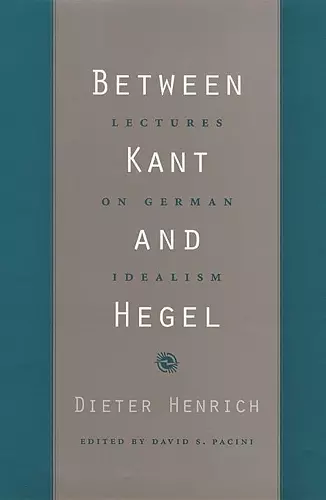Between Kant and Hegel
Lectures on German Idealism
Dieter Henrich author David S Pacini editor
Format:Paperback
Publisher:Harvard University Press
Published:30th Apr '08
Should be back in stock very soon

These are excellent lectures and make a valuable and exciting book. Henrich certainly gives a better introduction to the philosophizing that took place between Kant and Hegel than any other that I know of. He wants to show that the positions of Kant, Fichte, and Hegel each represent an option that is still open for live philosophical debate. Can there be a single-track systematic philosophy encompassing nature as well as mind? Dieter Henrich shows how this develops into a wide-ranging problem, allowing both for criticism of Kant and for constructive moves made after the criticisms are taken into account. He thus tries to show us argumentative steps by which one might proceed from a Kantian position to a Fichtean and then on to an Hegelian view. These lectures were given in 1973. Much has been done in English on Hegel since then, but relatively little on the "between" period which Dieter Henrich addresses. This is not an ordinary textbook. It's very much infused with Dieter Henrich's own philosophical views. The topics and people Dieter Henrich discusses he really illuminates, both in terms of the historical context and in terms of the soundness or lack of it of the philosophy he is discussing. He is himself deeply inside that tradition, yet knows enough about the work of those outside it to make quite comprehensible to the outsiders what it's like on the inside. -- J. B. Schneewind, Professor of Philosophy at Johns Hopkins University
Dieter Henrich's lectures on German idealism were the first contact a major German philosopher had made with an American audience since the onset of World War II. They remain one of the most eloquent interpretations of the central philosophical tradition of Germany and the way in which it relates to the concerns of contemporary philosophy.
Electrifying when first delivered in 1973, legendary in the years since, Dieter Henrich's lectures on German Idealism were the first contact a major German philosopher had made with an American audience since the onset of World War II. They remain one of the most eloquent explanations and interpretations of classical German philosophy and of the way it relates to the concerns of contemporary philosophy. Thanks to the editorial work of David Pacini, the lectures appear here with annotations linking them to editions of the masterworks of German philosophy as they are now available.
Henrich describes the movement that led from Kant to Hegel, beginning with an interpretation of the structure and tensions of Kant's system. He locates the Kantian movement and revival of Spinoza, as sketched by F. H. Jacobi, in the intellectual conditions of the time and in the philosophical motivations of modern thought. Providing extensive analysis of the various versions of Fichte's Science of Knowledge, Henrich brings into view a constellation of problems that illuminate the accomplishments of the founders of Romanticism, Novalis and Friedrich Schlegel, and of the poet Hölderlin's original philosophy. He concludes with an interpretation of the basic design of Hegel's system.
Belong[s] in the library of every serious student of German idealism. With this volume, Henrich has made a sophisticated, original, and altogether welcome contribution to the interpretation of philosophy between Kant and Hegel. -- Daniel Breazeale * Journal of the History of Philosophy *
Dieter Henrich’s Between Kant and Hegel is one of those rare scholarly works by which others are, and will be, judged, just as Henrich’s scholarship more generally provides a standard by which others in the area of German Idealism have been judged for no less than thirty years. -- Garth W. Green * Review of Metaphysics *
These are excellent lectures and make a valuable and exciting book. Henrich certainly gives a better introduction to the philosophizing that took place between Kant and Hegel than any other that I know of. He wants to show that the positions of Kant, Fichte, and Hegel each represent an option that is still open for live philosophical debate. Can there be a single-track systematic philosophy encompassing nature as well as mind? Dieter Henrich shows how this develops into a wide-ranging problem, allowing both for criticism of Kant and for constructive moves made after the criticisms are taken into account. He thus tries to show us argumentative steps by which one might proceed from a Kantian position to a Fichtean and then on to an Hegelian view. These lectures were given in 1973. Much has been done in English on Hegel since then, but relatively little on the ‘between’ period which Dieter Henrich addresses. This is not an ordinary textbook. It’s very much infused with Dieter Henrich’s own philosophical views. The topics and people Dieter Henrich discusses he really illuminates, both in terms of the historical context and in terms of the soundness or lack of it of the philosophy he is discussing. He is himself deeply inside that tradition, yet knows enough about the work of those outside it to make quite comprehensible to the outsiders what it’s like on the inside. -- J. B. Schneewind, Professor of Philosophy, Johns Hopkins University
- Nominated for Aldo and Jeanne Scaglione Prize for Studies in Germanic Languages and Literatures 2002
- Nominated for American Society for 18th-Century Studies Louis Gotschalk Prize 2004
- Nominated for Hans Rosenberg Book Prize 2004
- Nominated for George L. Mosse Prize 2004
ISBN: 9780674027374
Dimensions: unknown
Weight: unknown
400 pages